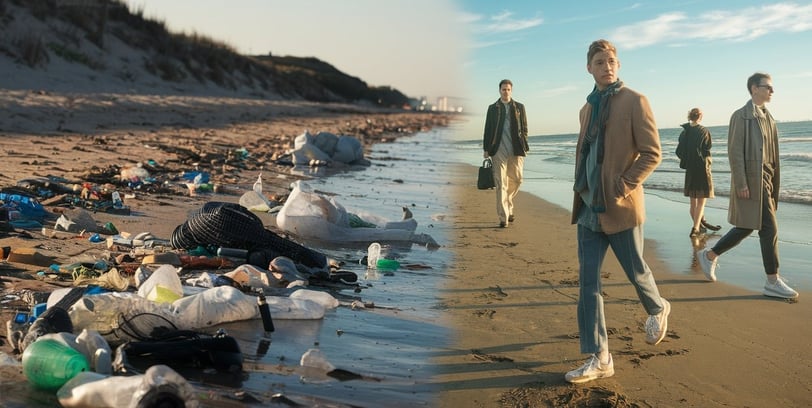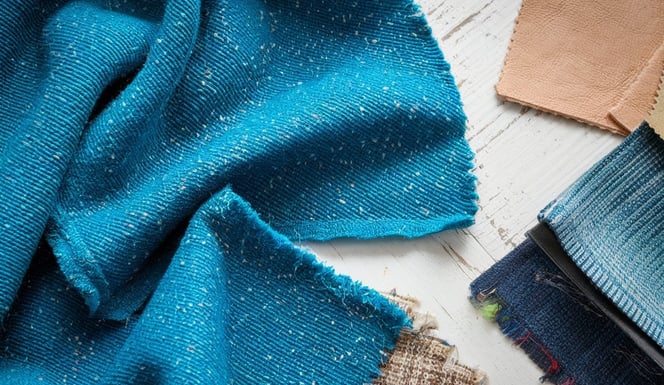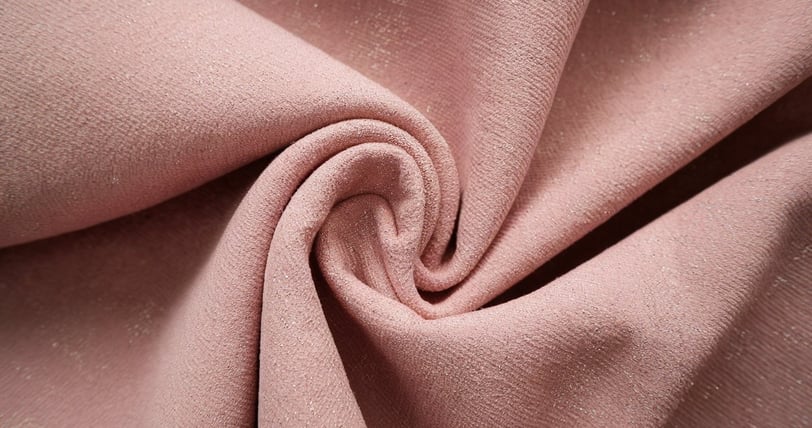What is Recycled Polyester: From Plastic Waste to Fabric
PolyScarf Team
2/5/20256 min read


Recycled polyester is a sustainable textile material made from post-consumer plastic waste, like PET bottles. As the world becomes more aware of the environmental impact of textile production, recycled polyester has emerged as an eco-friendly alternative to virgin polyester. This innovative material not only reduces waste in landfills but also minimizes the consumption of natural resources and energy needed to create new polyester fibers.
The process of making recycled polyester involves breaking down plastic waste into small flakes, melting them, and then spinning the molten material into new polyester fibers. These fibers can then be used to produce a wide range of textile products, from clothing and accessories to home furnishings and industrial applications.
Manufacturing Process
The manufacturing process of recycled polyester involves several key steps, each of which plays a crucial role in transforming plastic waste into high-quality textile fibers.
Collection and Sorting
The first step in the recycled polyester manufacturing process is the collection and sorting of post-consumer plastic waste, primarily PET (polyethylene terephthalate) bottles. These bottles are typically collected through curbside recycling programs or at designated recycling centers.
Once collected, the plastic bottles are sorted by color and type to ensure a consistent and high-quality end product. This sorting process is essential, as different types of plastics have varying chemical compositions and melting points, which can affect the quality of the recycled polyester fibers.
Cleaning and Processing
After sorting, the plastic bottles are thoroughly cleaned to remove any contaminants, such as labels, caps, and residual liquids. The cleaning process typically involves washing the bottles with hot water and detergents to ensure a clean and pure material for further processing.
Once cleaned, the bottles are shredded into small flakes, which increases the surface area and facilitates the melting process. These flakes are then dried to remove any excess moisture that could interfere with the quality of the final product.
Polymerization
The dried plastic flakes are melted and extruded through a spinneret, a device with tiny holes that shape the molten plastic into long, continuous filaments. These filaments are then cooled and solidified to form recycled polyester fibers.
The recycled polyester fibers can be stretched and textured to achieve desired properties, such as increased strength, elasticity, or softness. The fibers are then wound onto spools, ready to be woven or knitted into various textile products.


Environmental Benefits
The production and use of recycled polyester offer numerous environmental benefits compared to traditional virgin polyester.
Carbon Footprint Impact
One of the most significant environmental benefits of recycled polyester is its reduced carbon footprint. The production of recycled polyester requires significantly less energy compared to virgin polyester, as it eliminates the need for energy-intensive processes such as oil extraction and refining.
According to a study by the European Commission, the production of recycled polyester can lead to a 75% reduction in CO2 emissions compared to virgin polyester production. This substantial reduction in greenhouse gas emissions contributes to the fight against climate change and helps to mitigate the environmental impact of the textile industry.
Resource Conservation
Another key environmental benefit of recycled polyester is its ability to conserve natural resources. By using post-consumer plastic waste as a raw material, recycled polyester production reduces the demand for virgin petroleum-based resources, which are finite and non-renewable.
Furthermore, recycled polyester helps to conserve water resources, as it requires significantly less water during the manufacturing process compared to virgin polyester production. This is particularly important in regions where water scarcity is a pressing concern.
Common Applications
Recycled polyester has a wide range of applications across various industries, from fashion and home furnishings to industrial uses.
Textile Applications
In the textile industry, recycled polyester is commonly used to create a variety of clothing items, including t-shirts, sweatshirts, jackets, and activewear. Many fashion brands have embraced recycled polyester as a sustainable alternative to virgin polyester, incorporating it into their eco-friendly collections.
Recycled polyester is also used in home furnishings, such as bedding, curtains, and upholstery fabrics. These products offer consumers an environmentally conscious choice for decorating their homes without compromising on quality or style.
Industrial Uses
Beyond the textile industry, recycled polyester finds applications in various industrial sectors. In the automotive industry, recycled polyester is used to create car parts, such as seat cushions, headliners, and door panels, contributing to the production of more sustainable vehicles.
Recycled polyester is also used in the construction industry as insulation material, helping to improve the energy efficiency of buildings while reducing waste. Other industrial applications include the production of geo-textiles, filtration systems, and packaging materials.
Quality and Performance
One of the main concerns surrounding recycled polyester is its quality and performance compared to virgin polyester. However, advances in recycling technologies and manufacturing processes have significantly improved the quality of recycled polyester fibers in recent years.
Modern recycled polyester fibers exhibit similar strength, durability, and softness to their virgin counterparts. In many cases, it is difficult to distinguish between recycled and virgin polyester products based on touch and appearance alone.
Recycled polyester also retains the inherent benefits of polyester, such as its resistance to wrinkles, shrinking, and stretching, making it a practical and low-maintenance material for a wide range of applications.


Sustainability Challenges
Despite the numerous environmental benefits of recycled polyester, there are still some sustainability challenges that need to be addressed to maximize its positive impact.
Collection Infrastructure
One of the main challenges in the production of recycled polyester is the need for an efficient and widespread collection infrastructure for post-consumer plastic waste. While many countries have implemented curbside recycling programs, there is still room for improvement in terms of accessibility and public participation.
To ensure a steady supply of raw materials for recycled polyester production, governments, businesses, and communities must work together to strengthen collection systems and promote recycling habits among consumers.
Contamination Issues
Another challenge facing the recycled polyester industry is the issue of contamination. When plastic waste is not properly sorted or cleaned, it can lead to the presence of contaminants in the recycled polyester fibers, which can affect the quality and performance of the final product.
To address this issue, manufacturers must invest in advanced sorting and cleaning technologies to ensure a high-quality, contaminant-free raw material for recycled polyester production. Consumer education on proper recycling practices can also help to minimize contamination at the source.
Economic Impact
The growth of the recycled polyester industry has significant economic implications, creating new opportunities for businesses and employment while fostering a more circular economy.
As the demand for sustainable textile materials increases, companies that invest in recycled polyester production are well-positioned to capture a growing market share. This, in turn, can lead to job creation in the recycling, manufacturing, and textile sectors.
Furthermore, the use of recycled polyester can help businesses to reduce their raw material costs, as recycled polyester is often cheaper than virgin polyester. This cost savings can be passed on to consumers, making eco-friendly textile products more accessible and affordable.
Future Perspectives
As the world continues to prioritize sustainability and the circular economy, the future of recycled polyester looks promising, with ongoing technological innovations and evolving market trends.
Technological Innovations
Researchers and manufacturers are continually developing new technologies to improve the efficiency and quality of recycled polyester production. For example, advanced chemical recycling methods, such as glycolysis and methanolysis, are being explored to break down PET waste into its original monomers, allowing for the production of high-quality recycled polyester fibers that are indistinguishable from virgin fibers.
Other innovations, such as the use of blockchain technology to track the provenance of recycled materials, are also being developed to increase transparency and trust in the recycled polyester supply chain.
Market Trends
As consumer awareness of environmental issues grows, the demand for sustainable textile products, including those made from recycled polyester, is expected to continue rising. This trend is likely to drive further investment in recycled polyester production and innovation, as businesses seek to meet the evolving needs and preferences of eco-conscious consumers.
Furthermore, government policies and regulations aimed at promoting circular economy principles and reducing plastic waste are expected to create a more favorable environment for the growth of the recycled polyester industry in the coming years.
In conclusion, recycled polyester represents a promising solution to the environmental challenges posed by the textile industry. By turning post-consumer plastic waste into high-quality, sustainable fibers, recycled polyester offers numerous benefits, from reducing carbon emissions and conserving resources to driving economic growth and innovation. As the world moves towards a more circular and sustainable future, recycled polyester is poised to play an increasingly important role in shaping the textile industry of tomorrow.
Your Design, Your Style -
Premium Custom Scarves Shipped Direct to Australia
Contact us
QUICK LINKS
© 2025 PolyScarf by UR Silk. All rights reserved.
POLY SCARF


